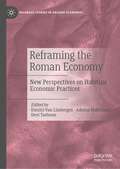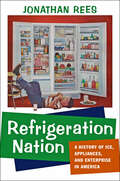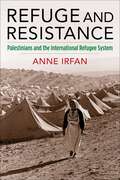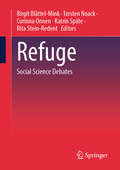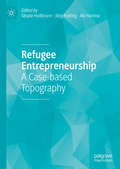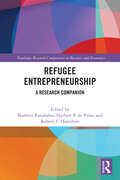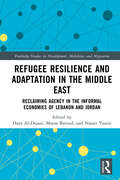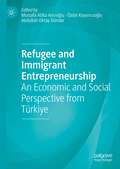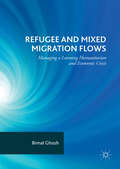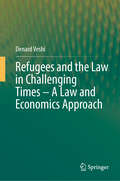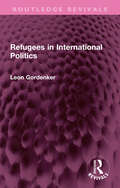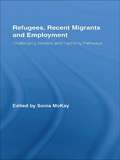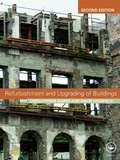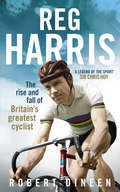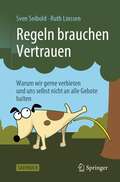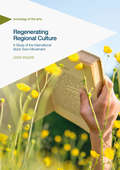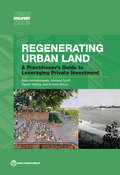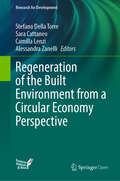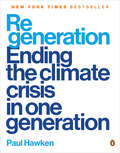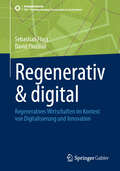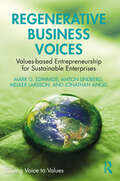- Table View
- List View
Reframing the Roman Economy: New Perspectives on Habitual Economic Practices (Palgrave Studies in Ancient Economies)
by Dimitri Van Limbergen Adeline Hoffelinck Devi TaelmanThis book focuses on those features of the Roman economy that are less traceable in text and archaeology, and as a consequence remain largely underexplored in contemporary scholarship. By reincorporating, for the first time, these long-obscured practices in mainstream scholarly discourses, this book offers a more complete and balanced view of an economic system that for too long has mostly been studied through its macro-economic and large-scale – and thus archaeologically and textually omnipresent – aspects. The topic is approached in five thematic sections, covering unusual actors and perspectives, unusual places of production, exigent landscapes of exploitation, less-visible products and artefacts, and divergent views on emblematic economic spheres. To this purpose, the book brings together a select group of leading scholars and promising early career researchers in archaeology and ancient economic history, well positioned to steer this ill-developed but fundamental field of the Roman economy in promising new directions.
Refrigeration Nation: A History of Ice, Appliances, and Enterprise in America (Studies in Industry and Society)
by Jonathan ReesHow we keep food cold while the house stays warm.Only when the power goes off and food spoils do we truly appreciate how much we rely on refrigerators and freezers. In Refrigeration Nation, Jonathan Rees explores the innovative methods and gadgets that Americans have invented to keep perishable food cold—from cutting river and lake ice and shipping it to consumers for use in their iceboxes to the development of electrically powered equipment that ushered in a new age of convenience and health.As much a history of successful business practices as a history of technology, this book illustrates how refrigeration has changed the everyday lives of Americans and why it remains so important today. Beginning with the natural ice industry in 1806, Rees considers a variety of factors that drove the industry, including the point and product of consumption, issues of transportation, and technological advances. Rees also shows that how we obtain and preserve perishable food is related to our changing relationship with the natural world.
Refuge and Resistance: Palestinians and the International Refugee System (Columbia Studies in International and Global History)
by Anne IrfanIn the decades after World War II, the United Nations established a global refugee regime that became central to the lives of displaced people around the world. This regime has exerted particular authority over Palestinian refugees, who are served by a specialized UN body, the Relief and Works Agency (UNRWA). Formed shortly after the 1948 war, UNRWA continues to provide quasi-state services such as education and health care to Palestinian refugee communities in the Middle East today.This book is a groundbreaking international history of Palestinian refugee politics. Anne Irfan traces the history and politics of UNRWA’s interactions with Palestinian communities, particularly in the refugee camps where it functioned as a surrogate state. She shows how Palestinian refugees invoked internationalist norms to demand their political rights while resisting the UN’s categorization of their plight as an apolitical humanitarian issue. Refuge and Resistance foregrounds how nonelite activism shaped the Palestinian campaign for international recognition, showing that engagement with world politics was driven as much by the refugee grass roots as by the upper echelons of the Palestine Liberation Organization. It demonstrates that refugee groups are important actors in global politics, not simply aid recipients.Recasting modern Palestinian history through the lens of refugee camps and communities, Refuge and Resistance offers vital new perspectives for understanding politics beyond the nation-state.
Refuge: Social Science Debates
by Birgit Blättel-Mink Katrin Späte Torsten Noack Corinna Onnen Rita Stein-RedentThe welcome culture of 2015 in Germany has, not least due to the (re)definition of safe countries of origin, turned into a deportation policy. How can this change in policy be understood and is it also accompanied by a change of attitude among the population? Which reasons for and which reasons against the admission of refugees are cited in social debates? This volume brings together analyses of the social discourse on dealing with refugees, questions of labour market integration and the practice of counselling refugees. Alongside academic analyses are reflective contributions from the practice of migration policy.With contributions by Olaf Struck.- David Stiller.- Helge Döring and Sebastian Kurtenbach.- Ann-Christine Lill, Janis Schneider and Sam Schneider.- Kirsten Hoesch. - Kathrin Weis.- Theresa Köhler and Kerstin Ettl.- Doris Beer.- André Pohlmann.- Katharina Resch, Gertraud Kremsner, Michelle Proyer, Camilla Pellech, Regina Studener-Kuras and Gottfried Biewe.The editors: Prof. Dr. Birgit Blättel-Mink is Professor of Sociology with a focus on industrial and organizational sociology at the Goethe University in Frankfurt/Main. Torsten Noack, M.A. Sociology, Head of the School for Work Education of the International Federation Stuttgart. Prof. Dr. Corinna Onnen is university professor for general sociology at the University of Vechta. Dr. Katrin Späte works at the Institute for Sociology at the University of Münster. Apl. Prof. Dr. Rita Stein-Redent works at the University of Vechta.
Refugee Entrepreneurship: A Case Based Topography
by Sibylle Heilbrunn Jörg Freiling Aki HarimaThrough a global series of case studies, this pioneering book delves into refugee entrepreneurship - a major economic, political and social issue emerging as a top priority. Stories from Australia, Germany, Pakistan and many other countries, highlight the obstacles facing refugees as they try to integrate and set up businesses in their new countries. Engaging contributions set the stage for a cross-analysis of the particularities and limitations faced by refugee entrepreneurs, culminating in an extended discussion about the future implications of refugee entrepreneurship for theory, policy and practice. This interdisciplinary book explores the motivations and drivers of refugee entrepreneurship, making it an insightful read not only for those engaged in entrepreneurship, but also for those interested in migration studies from a variety of academic disciplines.
Refugee Entrepreneurship: A Research Companion (Routledge Research Companions in Business and Economics)
by Ranabahu, Edited by NadeeraThis comprehensive volume explores the phenomenon of refugee entrepreneurship and advances the discussions and debates in the domain.The growing number of refugees across the world creates a compelling need to study the social and economic activities of refugees in different contexts, and to share experiences and debate how to better support refugee populations. This book covers academic, practical, and policy issues in refugee entrepreneurship, seeking to present the current status of research in this evolving field. The topics include how to identify and differentiate refugee entrepreneurship; refugees’ business practices; the personal, economic, and social values and impacts of refugee entrepreneurship; and the institutional support and role of ecosystems in facilitating refugee entrepreneurship. Future research directions are also outlined. This book provides scholars with the theoretical foundations and evidence base to advance refugee entrepreneurship research. Support agencies will learn from the experiences of others about the delivery of tailored support and policymakers will recognise the need for empathy and consistency in developing host country strategies for refugees.
Refugee Resilience and Adaptation in the Middle East: Reclaiming Agency in the Informal Economies of Lebanon and Jordan (Routledge Studies in Development, Mobilities and Migration)
by Haya Al-Dajani Nasser Yassin Maysa BaroudThis edited volume investigates how refugee communities in the Middle East have adapted to secure their livelihoods within the informal economy. Focusing on Lebanon and Jordan, which between 2011 and 2020 received more refugees as a proportion of their population than any other countries in the world, this edited volume investigates the informal mechanisms that Syrian refugees have adopted to fit into the informal economies of Lebanon and Jordan in the face of significant challenges and barriers. The volume investigates how legality, temporality, connectedness, gender, and geography, among other factors, have influenced the emergence of refugee communities’ informal adaptive mechanisms. Drawing on in-depth, original research among Syrian refugee tribal communities, agricultural workers, female-headed households, and micro-entrepreneurs, the volume provides tangible policy and practice recommendations to help to improve the situation of refugees and vulnerable populations that are employed in the informal economy. Highlighting the resilience and agency demonstrated by refugees, this edited volume’s original community-based analysis will be of interest to students, researchers, and professionals from across Middle East studies, refugee studies, informal labor economics, and development studies.
Refugee and Immigrant Entrepreneurship: An Economic and Social Perspective from Türkiye
by Mustafa Atilla Arıcıoğlu Özdal Koyuncuoğlu Abdullah Oktay DündarDue to political and economic instability in the Middle East and North Africa (MENA) countries, an increasing number of inhabitants continue to migrate to other countries. From here, they either join employment or become refugee or immigrant entrepreneurs. Such developments carry risks such as integration problems, but there are also significant opportunities. This book takes a deep dive into those challenges and potential prospects, and places special emphasis on Türkiye, a region that is significantly impacted by migration from Syria, Afghanistan, Pakistan and other African countries.Chapters explore the various issues around refugee and immigrant entrepreneurs within their host countries. Authors offer analysis of the difficulties experienced by such entrepreneurs in economic and socio-cultural contexts. Including various field examples using qualitative and quantitative research methods and economic implications using macro analysis, the book offers policy recommendations, examines the opportunities of refugee and immigrant entrepreneurship in Türkiye and explores the benefits to Türkiye from a holistic perspective.
Refugee and Mixed Migration Flows: Managing a Looming Humanitarian and Economic Crisis
by Bimal GhoshThis book provides an insightful analysis of the looming refugee and mixed migration crisis in the context of four major, contemporary flows: two in west and east Europe, and one each in the Americas and Asia. The analysis, in each case, is followed by a judicious identification of the key issues involved and the presentation of a set of proposed policy responses to them. The discussion is then placed in a global setting and dovetailed with the recently launched United Nations initiative to adopt global compacts on refugees and migrants. The author brings to this book, the first of its kind, his vast experience of advising, and actively engaging with, many of the principal international organisations concerned with refugee and migration issues. This book will be of interest to researchers, students, NGOs, professional bodies, national ministries, international organisations and rights groups in the fields of economics, public finance, political economy, human rights and refugee law, and international relations and demography.
Refugees and the Law in Challenging Times – A Law and Economics Approach
by Denard VeshiThis book focuses on the economic analysis of refugee law and the protection of refugee rights. It offers a law and economics model applied to migration and states. The book focuses on the most critical ‘push’ factors that impact lawmakers in enacting and modifying asylum law. Furthermore, the book examines the economic advantages and disadvantages of a centralized supernational asylum law (acquis communautaire) that could, eventually, eliminate competition between legal orders in asylum law and do away with the negative externalities caused by ‘asylum shopping’. The book critically analyses international refugee law, pursuing an interdisciplinary approach. Its principal goal is to explore refugee law through the lenses of the law and economics approach and against the backdrop of a human rights approach. After explaining the evolution of the human rights approach, the book elaborates on the legal and economic factors that impact refugees, on the one hand, and public policy, on the other. In conclusion, a balance that considers the national preferences of destination countries and the protection of refugee rights is proposed.
Refugees in International Politics (Routledge Revivals)
by Leon GordenkerOriginally published in 1987, Refugees in International Politics explores the nature of forced migration. It sets out systematically the factors that set refugees in motion and explains how and why a flexible network of organizations copes with the inescapable results of their presence. It suggests measures to reduce both the human suffering involved in forced migration and the disturbing effects of international relations.
Refugees, Recent Migrants and Employment: Challenging Barriers and Exploring Pathways (Routledge Research in Population and Migration)
by Sonia McKayUpheavals in vast areas of the world have led to a growing number of international refugees, a significant proportion of which have made their way to the West. At the same time, economic and social pressures, together with skills and labour shortages, have encouraged the migration for work of millions of workers worldwide. Although there has been a constant media focus on these two groups, little is known about their labour market experiences. This collection examines the problems faced by refugees and recent migrants in accessing employment as well as the policy frameworks that address the labour market rights of refugees and economic migrants.
Refurbishment and Upgrading of Buildings
by David Highfield Christopher GorseA detailed guide to the technical aspects of refurbishing and upgrading buildings, this book provides solutions to a range of problems, challenges and issues and is essential reading for all students studying building refurbishment at all levels. Includes: existing floor and wall strengthening facade retention introduction of new floors timber decay problems fire-resistance prevention of moisture and damp upgrading thermal and acoustic performance. This new edition has been fully updated to include new technological information, and covers new areas such as stonework restoration and repair, upgrading of c1960 framed buildings, refurbishment logistics and case-studies.
Refuse to Lose: Persistence Pays
by Jeffrey PfefferThis chapter provides examples of why determination and resilience, for either a company or an individual, should not be overlooked as important factors in producing successful business outcomes.
Reg Harris: The rise and fall of Britain's greatest cyclist
by Robert DineenReg Harris, whose statue overlooks the Manchester Velodrome, is the legend who all track cyclists want to emulate. He was a poor, working-class boy born in the Depression who escaped the Lancashire mills to utterly dominate his sport. He triumphed as world champion an incrediblefive times between 1947 and 1954 and performed medal-winning heroics at the London Olympics.At his peak he was the most adored sportsman in the country attracting huge crowds, sponsorship, and the company of the rich and famous. But, fiercely driven and ruthlessly single-minded, Harris had a dark side. His was a sensational life fuelled by an insatiable need for money, celebrity, fast cars and beautiful women that constantly threatened to destroy him. Following an exhaustive investigation, Robert Dineen has uncovered an epic sporting rise and fall – a story more astounding than anyone had known.
RegTech: A New Way to Manage Risks
by Jonas Heese James Barnett Aiyesha DeyA note on regulatory technology (RegTech) describing its evolution, use cases, and the competitive environment in 2021.
Regarding NAFTA
by Debora L. Spar Elizabeth B. SteinIn the aftermath of World War II, the countries of the industrialized world engaged in an unprecedented round of institution-building, through which historical barriers to international trade, especially tariffs, came tumbling down. The GATT has reshaped the environment of world trade to such an extent that international trade flows have exploded. Even as global trade has become more integrated, however, a second round of institutions, regional rather than global, has emerged. The most recent and largest of the major regional institutions, NAFTA, was signed on December 17, 1992, and took effect in early 1994. This case examines the effect of this radically new institutional context on three different firms, each representing a different industry and country.
Regeln brauchen Vertrauen: Warum wir gerne verbieten und uns selbst nicht an alle Gebote halten
by Ruth Linssen Sven SeiboldMenschen brauchen Regeln und Menschen rebellieren gegen Regeln. Regeln geben uns Sicherheit und zugleich schränken sie uns ein. Gegen manche Regeln leisten Menschen aktiv Widerstand oder unterlaufen sie heimlich – mit Negativfolgen für alle. Das Sachbuch zeigt, wie man klug mit Regeln und mit Regelbrechern umgeht. Sie erkennen, warum viele Menschen Regeln einhalten und manche Menschen Regeln brechen. Und warum Vertrauen tatsächlich besser ist als Kontrolle. Aus dem Inhalt: Warum man Regeln braucht, warum sich manche Menschen an Regeln halten und andere nicht, welche Regeln wirksam sind, warum Vorbilder unersetzbar sind, wie man Gutwillige bei der Stange hält, wie man mit Regelbrüchen umgeht, wie man böse Fallen vermeidet. Über die Autor:innen: Sven Seibold ist Psychologe und Professor für Wirtschaftspsychologie. Er berät Unternehmen in Fällen von Mobbing, Burn-out, Wirtschaftskriminalität und Wirtschaftsspionage. Ruth Linssen ist Professorin für Soziologie und Recht an der Fachhochschule Münster. Sie berät und schult Behörden und Unternehmen zu den Themen Compliance und Korruptionsprävention.
Regency Plaza
by William J. Poorvu Richard E. CrumDesigned to examine the process of project management during the development cycle of a luxury condominium building, exploring the issue of how the design, development strategy, project organization, and project personnel are interrelated. More specifically, looks at how these factors shape the day-to-day operations of a development and how they affect the formal and informal mechanisms that a project manager has at his or her disposal. Students are asked to design floor plans for a portion of one floor to point up the importance of the difficulties in creating workable and saleable units.
Regenerating Regional Culture
by Jane FrankThis book explores the significance of the international book town movement and its impact on contemporary society. It examines how book towns have emerged and how their culture and unique characteristics help to explain a steadily growing phenomenon that has enabled peripheral communities around the world to reclaim their economic futures and impact on the cultural sphere as increasingly powerful sites and sources of creativity. Regenerating Regional Culture assesses why, at a time when the book industry is experiencing a profound transformation, book towns are proliferating in Europe and across the globe. It acknowledges the role of the book as a catalyst for this significant cultural activity and development. The book is shown to be a unique and pivotal item of cultural consumption, a remarkable artefact and, more than ever before, a springboard for contemporary cultural debate. This work investigates how the reanimation of these 'down-on-their-luck' towns is attracting, through a combination of nostalgia, history and cultural heritage, a growing middle class cohort who seek both intellectual stimulation and opportunities for serious leisure and wellbeing. This book will prove to be a useful resource for understanding the impacts of book towns on art, culture and society while also offering insightful research for those involved in existing or future development of book towns and other community cultural projects.
Regenerating Urban Land: A Practitioner's Guide to Leveraging Private Investment
by Altman Rana Amirtahmasebi Sameh Wahba Mariana OrloffRegenerating Urban Land draws on the experience of eight case studies from around the world. The case studies outline various policy and financial instruments to attract private sector investment in urban regeneration of underutilized and unutilized areas and the requisite infrastructure improvements. In particular, each case study details the project cycle, from the scoping phase and determination of the initial amount of public sector investment, to implementation and subsequent leveraged private-sector funds. This manual analyzes rates of return on the investments and long-term financial sustainability. Regenerating Urban Land guides local governments to systematically identify the sequence of steps and tasks needed to develop a regeneration policy framework, with the participation of the private sector. The manual also formulates specific policies and instruments for expanding private sector participation; structuring effective administrative and legal frameworks; utilizing land readjustment/assembly methods; determining duration of contracts, adequate phasing, and timeline; and balancing the distribution of risk and sustainability measures.
Regeneration of the Built Environment from a Circular Economy Perspective (Research for Development)
by Alessandra Zanelli Camilla Lenzi Stefano Della Torre Sara CattaneoThis open access book explores the strategic importance and advantages of adopting multidisciplinary and multiscalar approaches of inquiry and intervention with respect to the built environment, based on principles of sustainability and circular economy strategies. A series of key challenges are considered in depth from a multidisciplinary perspective, spanning engineering, architecture, and regional and urban economics. These challenges include strategies to relaunch socioeconomic development through regenerative processes, the regeneration of urban spaces from the perspective of resilience, the development and deployment of innovative products and processes in the construction sector in order to comply more fully with the principles of sustainability and circularity, and the development of multiscale approaches to enhance the performance of both the existing building stock and new buildings. The book offers a rich selection of conceptual, empirical, methodological, technical, and case study/project-based research. It will be of value for all who have an interest in regeneration of the built environment from a circular economy perspective.
Regeneration: Ending the Climate Crisis in One Generation
by Paul HawkenA radically new understanding of and practical approach to climate change by noted environmentalist Paul Hawken, creator of the New York Times bestseller DrawdownRegeneration offers a visionary new approach to climate change, one that weaves justice, climate, biodiversity, equity, and human dignity into a seamless tapestry of action, policy, and transformation that can end the climate crisis in one generation. It is the first book to describe and define the burgeoning regeneration movement spreading rapidly throughout the world. Regeneration describes how an inclusive movement can engage the majority of humanity to save the world from the threat of global warming, with climate solutions that directly serve our children, the poor, and the excluded. This means we must address current human needs, not future existential threats, real as they are, with initiatives that include but go well beyond solar, electric vehicles, and tree planting to include such solutions as the fifteen-minute city, bioregions, azolla fern, food localization, fire ecology, decommodification, forests as farms, and the number one solution for the world: electrifying everything. Paul Hawken and the nonprofit Regeneration Organization are launching a series of initiatives to accompany the book, including a streaming video series, curriculum, podcasts, teaching videos, and climate action software. Regeneration is the inspiring and necessary guide to inform the rapidly spreading climate movement.
Regenerativ & digital: Regeneratives Wirtschaften im Kontext von Digitalisierung und Innovation (SDG - Forschung, Konzepte, Lösungsansätze zur Nachhaltigkeit)
by Sebastian Flock David PinzautiDieses Fachbuch beschäftigt sich mit der Schnittmenge zwischen regenerativen Geschäftsmodellen und den Möglichkeiten der Digitalisierung und Innovationen in diesem Bereich. Unternehmen spielen eine Schlüsselrolle in der Gestaltung unserer wirtschaftlichen, sozialen und ökologischen Zukunft. Sie haben die Möglichkeit, neue Standards zu setzen und regenerative Prinzipien in ihre Geschäftsmodelle zu integrieren. Das Buch macht deutlich, wie regeneratives Wirtschaften unter sinnvoller Zuhilfenahme digitaler Produkte und Services und entlang bekannter Innovationsmethoden gelingen kann. Innerhalb der Einordnung hilft ein Trendradar dabei, die aktuellen Entwicklungen möglichst gesamthaft abzubilden. Es werden ausführlich 15 Erfolgsgeschichten aus der Wirtschaft vorgestellt, die dazu anleiten und ermutigen sollen, es diesen positiven Beispielen gleich zu tun. So wird konkret gezeigt, welche praktischen und umsetzbaren Lösungen es für die Erreichung der SDG-Ziele 9 "Industrie, Innovation & Infrastruktur" und 12 "Nachhaltige/r Konsum und Produktion" gibt. Das eigens entwickelte „Regenerativ & Digital Opportunity Framework&“ gibt darüber hinaus eine Methode an die Hand, mit der jedes Unternehmen selbst wirksam werden kann. Der Inhalt Regenerative Nachhaltigkeit: Ein systemischer Ansatz Einführung in das Konzept des regenerativen Wirtschaftens Der Fußabdruck der digitalen Welt Trendradar regenerativer und digitaler Geschäftsmodelle Case Studies regenerativer Unternehmen Verdichtung und Handlungsempfehlungen
Regenerative Business Voices: Values-based Entrepreneurship for Sustainable Enterprises (Giving Voice to Values)
by Mark G. Edwards Anton Lindberg Melker Larsson Jonathan AngelThis is a book about the future of sustainability. Regenerative Business Voices: Values-based Entrepreneurship for Sustainable Enterprises tells the stories of four regenerative organizations and the people who have founded them and guided them towards sustaining futures.Regenerative sustainability recognizes the urgency of transforming organizations to reverse the unsustainable pathways we are currently on. Regenerative businesses do not simply do less harm, or produce zero emissions, or optimize the efficient use of natural resources; they also restore and enhance well-being in social and ecological systems. The stories presented here are analyzed using the business ethics approach called Giving Voice to Values (GVV). Through the application of GVV principles, we uncover the processes involved in how regenerative businesses develop and function, and gain insights into how business leaders voice their deep convictions, overcome silencing rationalizations, normalize their execution of personal choice, discover deep purpose in their work, and draw on their personal histories to create new ways of doing business. We present and analyze these cases to understand how and why expressing values can be so crucial in developing sustainable businesses, and to provide practical examples of how individuals can generate enthusiasm, counter objections, gain allies, and prepare for and practice conversations that help them move forward.The book offers managers and sustainability consultants a new way of understanding some of the central dynamics involved in business ethics and organizational change for sustainability. It will be immensely valuable to educators, business students, and practitioners interested in sustainability, environmental business ethics, and corporate social responsibility topics.
